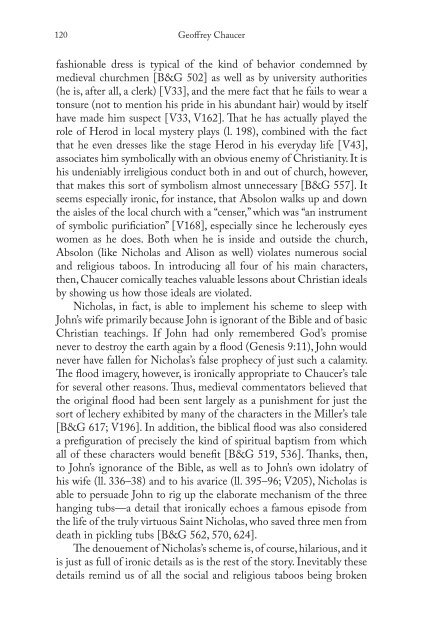Bloom's Literary Themes - ymerleksi - home
Bloom's Literary Themes - ymerleksi - home
Bloom's Literary Themes - ymerleksi - home
Create successful ePaper yourself
Turn your PDF publications into a flip-book with our unique Google optimized e-Paper software.
120<br />
Geoffrey Chaucer<br />
fashionable dress is typical of the kind of behavior condemned by<br />
medieval churchmen [B&G 502] as well as by university authorities<br />
(he is, after all, a clerk) [V33], and the mere fact that he fails to wear a<br />
tonsure (not to mention his pride in his abundant hair) would by itself<br />
have made him suspect [V33, V162]. That he has actually played the<br />
role of Herod in local mystery plays (l. 198), combined with the fact<br />
that he even dresses like the stage Herod in his everyday life [V43],<br />
associates him symbolically with an obvious enemy of Christianity. It is<br />
his undeniably irreligious conduct both in and out of church, however,<br />
that makes this sort of symbolism almost unnecessary [B&G 557]. It<br />
seems especially ironic, for instance, that Absolon walks up and down<br />
the aisles of the local church with a “censer,” which was “an instrument<br />
of symbolic purificiation” [V168], especially since he lecherously eyes<br />
women as he does. Both when he is inside and outside the church,<br />
Absolon (like Nicholas and Alison as well) violates numerous social<br />
and religious taboos. In introducing all four of his main characters,<br />
then, Chaucer comically teaches valuable lessons about Christian ideals<br />
by showing us how those ideals are violated.<br />
Nicholas, in fact, is able to implement his scheme to sleep with<br />
John’s wife primarily because John is ignorant of the Bible and of basic<br />
Christian teachings. If John had only remembered God’s promise<br />
never to destroy the earth again by a flood (Genesis 9:11), John would<br />
never have fallen for Nicholas’s false prophecy of just such a calamity.<br />
The flood imagery, however, is ironically appropriate to Chaucer’s tale<br />
for several other reasons. Thus, medieval commentators believed that<br />
the original flood had been sent largely as a punishment for just the<br />
sort of lechery exhibited by many of the characters in the Miller’s tale<br />
[B&G 617; V196]. In addition, the biblical flood was also considered<br />
a prefiguration of precisely the kind of spiritual baptism from which<br />
all of these characters would benefit [B&G 519, 536]. Thanks, then,<br />
to John’s ignorance of the Bible, as well as to John’s own idolatry of<br />
his wife (ll. 336–38) and to his avarice (ll. 395–96; V205), Nicholas is<br />
able to persuade John to rig up the elaborate mechanism of the three<br />
hanging tubs—a detail that ironically echoes a famous episode from<br />
the life of the truly virtuous Saint Nicholas, who saved three men from<br />
death in pickling tubs [B&G 562, 570, 624].<br />
The denouement of Nicholas’s scheme is, of course, hilarious, and it<br />
is just as full of ironic details as is the rest of the story. Inevitably these<br />
details remind us of all the social and religious taboos being broken
















